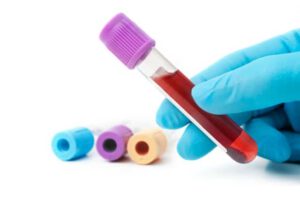
Tay-Sachs is a severe disease that causes neurological problems. Tay-Sachs disease is usually fatal, babies with this condition usually do not pass the age of 4 years. Since it is considered one of the most severe genetic disorders, it is tested in all genetic prenatal screenings.
Babies with Tay-Sachs are usually born healthy and develop normally until the age of six months. Around this age, symptoms start to show, these include development regression and a loss of physical abilities, such as a loss of vision.
There is no known cure for Tay-Sachs disease. This condition is fatal by ages 3-4. Tay-Sachs is inherited from both parents. This means that to have Tay-Sachs, both parents must be carriers of a faulty gene that contains the enzyme beta hexosaminidase. For this reason, it is highly important that parents undergo genetic carrier tests before the pregnancy, to help manage the pregnancy accordingly if a risk is detected.
What are the risk factors and affected populations?
Parents who are carriers of Tay-Sachs live healthy lives and do not suffer clinical implications. People normally have 2 genes that are responsible for making the enzyme beta hexosaminidase. Tay-Sachs carriers have one faulty gene and one normal gene (which means they will develop the disease themselves).
Tay-Sachs disease is prevalent among Jewish people of Ashkenazi descent, but it can also be found in other populations.
An increased risk of Tay-Sachs can be found in the following populations:
- Jewish people of Ashkenazi descent (Eastern and Central Europe): Tay-sachs is found more often in Ashkenazi Jews, the carrier rate is around 1 in 30 people.
- Jewish people of North African descent: it has been recently discovered that Jewish people of North African descent (mainly Moroccan descent) also have a high prevalence of carrying the Tay-Sachs mutation, the carrier rate is around 1:100.
- French Canadian descent: some French-Canadian communities in Southeast Quebec also have increased prevalence of Tay-Sachs.
- The Cajun community of Louisiana
- Old Amish community: people of the Old Order Amish community in Pennsylvania have an increased prevalence of Tay-Sachs carriers.
Prenatal diagnosis
Since there is no cure for Tay-Sachs, it is important to diagnose the possibility of being a carrier even before the pregnancy. Some communities even screen for Tay-Sachs carriers before marriage (especially in communities that do not undergo prenatal testing during the pregnancy).
Today, couples planning a pregnancy are referred to genetic counselling that includes several blood tests according to their ethnic descent. These blood tests are usually undergone by the mother, and in cases of a specific risk are also repeated in the father.
If a woman has been diagnosed as a Tay-Sachs carrier, there is no reason to worry about the child being born with this disease. If the mother is indeed a carrier, the father should also be testes and if he is not a carrier there is no risk of the child developing this disease.
If both the mother and father are found to be carriers of the Tay-Sachs mutation, there is a 25% chance that their child will develop the disease, and genetic counselling is recommended to consider all possible options regarding the future pregnancy.
What to do if both parents are carriers?
When both parents are Tay-Sachs carriers, there is a significant change their child will develop the disease. Here are the recommendations in these cases:
CVS test in weeks 10-13
Couples that find out they are carriers before the pregnancy must urgently undergo chorionic villus sampling (CVS) in weeks 10-13 of pregnancy. This test can determine if the fetus has the disease, and it allows the parents to consider all options about continuing the pregnancy. Although CVS carries a 1-2% chance of miscarriage, this test is vital since later diagnosis of Tay-Sachs also means a more complicated termination of the pregnancy.
Preimplantation genetic diagnosis (PGD)
Genetic tests such as PGD (Preimplantation genetic diagnosis) are recommended to parents before embryo implantation, these tests are also suitable for couples who are Tay-Sachs carriers. This procedure is performed during in vitro fertilization (IVF). In PGD, the genetic material of the fetus is tested at an early stage of the IVF process to determine whether the fetus has Tay-Sachs.
According to the PGD test results, only healthy embryos are returned to the uterus. This ensures that the baby will not develop the disease, despite the parents being carriers.

